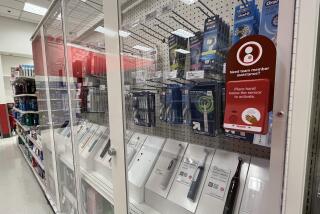Making retailers liable for damages from hacking

SACRAMENTO — The recent hacking of customer data from Target Corp. computers is roiling the California Legislature.
Last week, two members of the Assembly touted a bill to strengthen consumer safeguards and limit the type of information collected and retained by retailers.
The measure, AB 1710, may trigger one of the year’s biggest disputes over business-related legislation. “It’ll be a big fight, a tough fight,” said Bill Dombrowski, president of the California Retailers Assn. His members include nearly every national retail chain, employing 2.8 million workers statewide.
The most controversial feature of the bill would shift the responsibility for any data breach from the banks and credit card issuers to the retail businesses where the breach occurred.
Specifically, retailers would be responsible for notifying customers of any hacking incident and would be liable for financial damages.
“Financial institutions should not be taking the heat for a data breach that occurs at a retailer,” said Assemblyman Roger Dickinson (D-Sacramento), a bill co-author along with Assemblyman Bob Wieckowski (D-Fremont).
Such a change is too sweeping, Dombrowski said. “We’ve got a system in place where we allocate costs based on who is responsible for the problem,” he said.
Consumer and privacy advocates are backing the Assembly bill, which they consider the broadest in the nation. Among other things, it would prohibit the sale of Social Security numbers.
“The public wants something done here,” said Lenny Goldberg, a lobbyist for the Privacy Rights Clearinghouse.
A way to disable a stolen cellphone
Data breaches aren’t the only high-profile, high-tech issue at the Capitol.
State Sen. Mark Leno, a San Francisco Democrat, on Tuesday won a crucial first committee vote for a bill aimed at preventing the theft of smartphones and tablets. The measure, SB 962, would require they be equipped with so-called kill switches. These would enable smartphone owners to remotely disable their devices if they are stolen.
“Smartphone robberies have become epidemic in cities across California, mainly because there is a financial incentive to steal them and resell these valuable devices on the black market,” Leno said.
The bill is supported by law enforcement, consumer groups and local governments. Cellphone makers and tech companies, including Apple Inc., Microsoft Corp. and Google Inc., want to improve security, but don’t like the bill. As written, it is unworkable, limits consumer choice and threatens privacy, Apple said.
High marks for creating jobs
California may not be as business-unfriendly as critics contend.
A study by Arizona State University’s W.P. Carey School of Business ranks the Golden State third for creating jobs in 2013, up 3% over the previous year. That’s behind only oil-rich North Dakota, up 3.6%, and Utah, up 3%.
Riverside came in first in the country for job growth in large U.S. metropolitan areas — up 4%. San Francisco was second at 3.9%. Los Angeles, with 2.6% growth, tied for eighth place with Dallas, Miami and San Diego.
Twitter: @MarcLifsher







